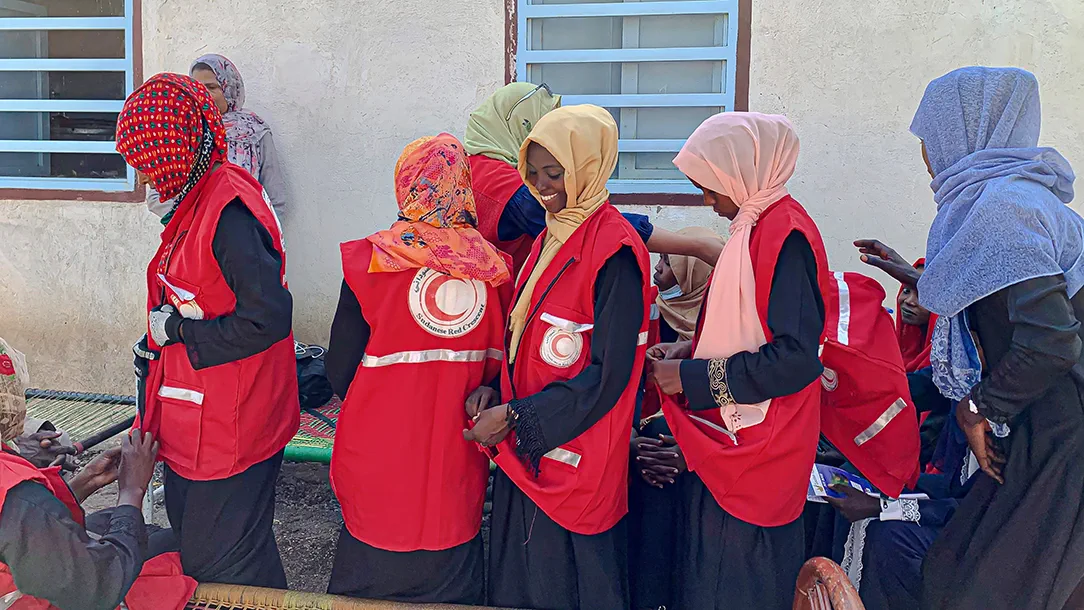"Our work is going to have a long-lasting impact"
Red Cross delegate Anastasiia explains our wellbeing project in Sudan, as we celebrate the women and girls involved
Last updated` 18 April 2024
“I believe that each and every community has a lot of natural helpers who are always the first responders,” says Anastasiia, a Danish Red Cross delegate who until recently was based in Sudan. “They are on the ground before humanitarian actors arrive, and in every context, many such natural helpers are women.”
In Sudan, Anastasiia worked hand in hand with her Sudanese Red Crescent counterparts on a women and girls’ wellbeing project, which is made possible thanks to funds raised by players of People’s Postcode Lottery, and awarded by Postcode International Trust.
In April 2023, clashes broke out in the Sudanese capital of Khartoum. Over 14,700 people are reported to have died, while a further 27,700 have been injured.
The Sudanese Red Crescent Society has been on the ground since the fighting erupted. With a presence in all 18 states of the country and 8,800 volunteers, the Sudanese Red Crescent has been providing first aid and urgent medical care, along with emergency supplies like food, water, and hygiene products, as well as psychosocial support.
The British Red Cross is keeping close contact with our colleagues at the Sudanese Red Crescent and the Danish Red Cross, to monitor and assess the situation as it unfolds.

Supporting women and girls on their journeys to safety
A highly skilled team of Sudanese Red Crescent staff and volunteers work tirelessly at three key intervention points in Eastern Sudan: at border reception centres, at refugee camps, and at safe houses.
The women and girls who arrive at these places have often been through unimaginable experiences on their journeys to safety. Women and girls on this route are some of the world’s most vulnerable people, facing a range of potential dangers including human trafficking and gender-based violence.
It is at these intervention points that the biggest difference can be made, as Red Crescent staff and volunteers work together with local authorities and other humanitarian actors in the region. That includes:
- providing services within safe houses to protect survivors of trafficking and sexual and gender-based violence
- providing psychological first aid and essential supplies, like food, water, and sanitary products to new arrivals
- training psychologists from the Sudanese public health system with additional skills
- hosting trafficking and sexual and gender-based violence awareness-raising activities to boost communities' resilience to potential dangers.
So far more than 6,500 women and girls have benefited from the project including more than 900 women and girl survivors who we have helped to feel safe and well again as they move on to rebuild bright lives.
That includes Edana, whose story we featured last year. Edana found her life in danger after she fled her village, only to be trafficked and subjected to sexual violence.
AFTER SPEAKING TO THE SOCIAL WORKERS AND SOME OF THE OTHER RESIDENTS, I STARTED TO OPEN UP. I FELT SAFE.
Edana, one of the beneficiaries of the project
After being rescued, she was admitted to a safe house where the team helped her heal from her trauma. At first, she found it hard to trust people, but she slowly began to feel more comfortable.
“After speaking to the social workers and some of the other residents, I started to open up a bit; I felt safe,” Edana said.
Edana eventually left the safe house with high hopes for her future and is now rebuilding her life in another country.
“The project has two main objectives,” explains Anastasiia. “One is to strengthen women and girls’ sense of dignity and well-being, and the other is to increase communities’ awareness of the key protection issues that migrants and refugees might experience on their journeys, including trafficking and sexual violence.”
A programme led by women, for women
Much of the project is delivered by Sudanese Red Crescent staff and volunteers who are representatives of the displaced community themselves.
“This is a major achievement because they have unique insights into and knowledge of the cultures of their communities and have developed a high level of trust with the women and girls we are working with,” says Anastasiia. “Without this trust, the work is at best superficial and at worst causes further harm. This could not be further from the case for our project, where our volunteers are highly respected. I know that, because of this, our work is going to have a long-lasting impact.”
On a personal level, Anastasiia can relate to the women and girls she meets in Sudan. When the conflict in Ukraine started in 2014, Anastasiia relocated from her home in the western part of the country to the eastern part to support with humanitarian efforts. Just over a year into the conflict’s escalation, many of her fellow Ukrainians have fled to other parts of the country, or across borders.
“While I was working in Sudan and away from my family in Ukraine, I was so anxious about my family’s safety,” she says. “I think going through this has increased my capacity for empathy. I had empathy before of course, but this very personal experience has really put me in the shoes of the people we work with.”
Read more

Our programme supporting refugee women and girls in East Sudan
Over the past decade, thousands of migrants and refugees have travelled through Sudan

“They made us feel safe and when we were sick, they looked after us.”
The project that connects girls and older women in safe spaces in Sudan

“Nothing is as painful as being separated from your family”
How one father of three was reunited with his family after three long years apart


